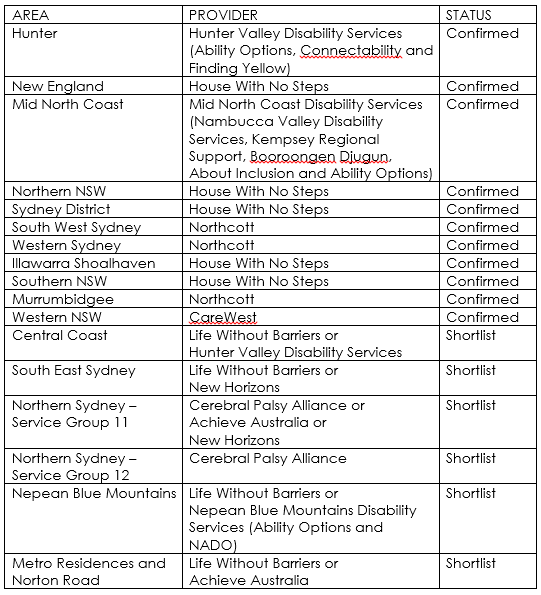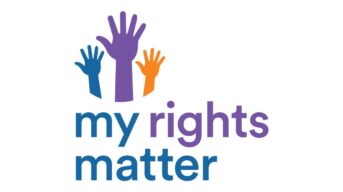
Even less choice: the latest on the ADHC transfer of services
People living in Ageing, Disability and Home Care group homes across the state and their families are dismayed at losing the small amount of influence they were promised in determining their new service provider.
They were originally told they would be presented with a shortlist and consulted about which provider they would prefer take over their group home. Instead, they have been asked to choose from a shortlist of only one provider.
As far as short lists go, that’s a very short list.
From the start, the NSW Government’s process for tendering out its disability services has been deeply flawed. Unlike in the ACT, the Government announced that they would decide which service provider took over each group home, not the people living in them. This approach was completely at odds with the National Disability Insurance Scheme.
In a concession, the Government did say they would consult people with disability and families on a short list of providers before choosing the one provider to take over all of the group homes in an ADHC region.
These “consultations” have now occurred in 12 regions, but only in one, Western Sydney, has there been more than one provider on the shortlist. Families in three regions are still waiting to hear about shortlists and consultations for their areas.
See below for the shortlisted providers in each region. [as at 27 June 2017]
In eight regions, ADHC has now announced that the shortlisted provider has been confirmed to take over the group homes.
Many parents have told us of their anger at this whole process. In some cases, people with disability and their families have previously had negative experiences with the provider the Government has chosen, and they now have concerns for the welfare of their loved ones.
Given the high numbers of organisations NSW CID had heard were planning to tender for group homes, we were most surprised by these “shortlists of one”. We also know that there were consortiums of a number of providers planning to tender in many areas and if these consortiums had been successful, they may have then offered the residents of each group home a real choice about which member of the consortium would take over their group home. Consortiums are currently shortlisted in only two areas. We hope that these consortiums are offering choice to residents.
The shortlists are dominated by three providers. It is no doubt much simpler for Government to be dealing with a small number of providers as they rush to meet their self-imposed deadline of exiting service provision by June 2018. If the Government’s approach has been influenced by what is efficient for them, it is at the cost of community confidence and trust.
Heightened concern for people with complex needs
This whole process is particularly galling for parents of people with complex needs. To date, ADHC has been the predominant service provider for people with complex needs and there remains a major question mark about whether the non-government sector will be willing and able to fill this role.
This has been highlighted by the NSW Auditor General, who in a recent report to Parliament warned that the “non-government sector capacity to provide complex clinical support is limited and supply and choice of services in rural and remote areas will be limited”.
It has been common over decades for non-government agencies not to be up to the task of meeting complex needs. In many case residents who previously moved into the care of non-government agencies have had to move to ADHC services.
Even if all of the people living in a particular group home are opposed to the provider ADHC chooses, they will not be able to change their provider for two years. In an interview with the ABC, new Disability Services Minister Ray Williams said that, in the meantime, people with disability could leave their home to seek a different provider. But, where are the homes with vacancies that people could move to? And why should people have to leave their homes because the Government has imposed on them a service provider they don’t want?
Community anxiety about the tender out of ADHC services has been further fuelled by last week’s Four Corners report on abuse in group homes.
There are many decisions to come about which non-government organisations will take over other ADHC services. While we know the Benevolent Society is taking over all community support teams, decisions are yet to come on a range of other service groupings, including some for people with particularly complex needs, the Community Justice Program, Integrated Services Program and Statewide Behaviour Intervention Service.
On a positive note
There is one positive in the recent announcements. The Government is not granting leases on group home real estate to service providers, but to separate housing providers who may be community housing organisations. This gives people living in the homes more security if they fall out with their service provider.
Call for safeguards
NSW CID has protested the Government’s tender process from the start. If the Government remains determined to proceed with it, it should at the very least include these safeguards in the process:
- ADHC must not cease providing services until it is clearly shown that the non-government sector is meeting the needs of all ADHC clients with complex needs.
- ADHC must fund a robust and transparent role for the Ombudsman for the real-time monitoring of the change of service providers and transition into the NDIS for people with complex needs.
- ADHC and the National Disability Insurance Agency must work out real opportunities for residents to immediately change service providers if they are opposed to the provider chosen by ADHC.
The Federal Government has announced a Quality and Safeguarding Framework for the NDIS, which on paper is promising in its capacity to require, monitor and police good practice in supported accommodation. However, much of the detail of the framework is yet to be worked out, and the proof of its value will be in how well resourced it is, and the strength and independence of its leaders.




 1800 424 065
1800 424 065 













